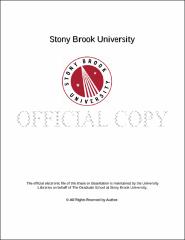| dc.identifier.uri | http://hdl.handle.net/11401/76528 | |
| dc.description.sponsorship | This work is sponsored by the Stony Brook University Graduate School in compliance with the requirements for completion of degree. | en_US |
| dc.format | Monograph | |
| dc.format.medium | Electronic Resource | en_US |
| dc.language.iso | en_US | |
| dc.publisher | The Graduate School, Stony Brook University: Stony Brook, NY. | |
| dc.type | Dissertation | |
| dcterms.abstract | Tyrosine kinases play a vital role in proper cell growth and function. Aberrantly activated kinases often lead to diseases and have been recognized as important drivers of cancer. Aberrant kinase activity can occur by various mechanisms, such as by kinase overexpression or by activating mutations. This dissertation examines the effect of cancer associated mutations on two non-receptor tyrosine kinases. The first part of the dissertation will focus on breast tumor kinase (Brk, also known as PTK6), first identified in breast tumor samples. The second part of the dissertation focuses on hematopoietic cell kinase (Hck), which is implicated in drug resistance in chronic myelogenous leukemia (CML). Overexpression of Brk has been implicated in several cancers. Recently, several cancer-associated mutations to Brk have been identified. Whether these mutations affect Brk activity and contribute to tumorigenic growth has not been determined. We have examined a panel of mutations, which were identified in different cancers and span different domains of Brk. We showed that several of the mutations activate Brk. Two of the mutations appear to activate Brk by disrupting its autoinhibitory interactions. While the mutations led to increased Brk activation, expression of the mutants did not result in increased cell growth or transformation. We show that this may be due to differential effects on substrate recognition and activation by the different mutants. We have also examined the effect of cancer-associated mutations on activation of Hck. While Hck is mainly expressed in cells of hematopoietic origin, several Hck mutations have been identified in various cancer samples derived from different cell types. The mutations we examined are all found in the kinase domain of Hck. One of these mutations, E389K, is adjacent to the autophosphorylation site of Hck and could potentially inactivate the protein. A previous study suggested that the E389K mutation could be linked to increased survival in ovarian cancer. The cancer-associated mutations we examined all decreased Hck activity to varying degrees as observed by measuring their effect on enzymatic activity, autophosphorylation, and activation of WASP, a known substrate of Hck. Given the role of Hck in diseases such as CML, these inactive variants of Hck may serve as tumor suppressors. | |
| dcterms.available | 2017-09-20T16:50:33Z | |
| dcterms.contributor | Talmage, David | en_US |
| dcterms.contributor | Miller, W Todd | en_US |
| dcterms.contributor | Seeliger, Markus | en_US |
| dcterms.contributor | Hayman, Michael. | en_US |
| dcterms.creator | Tsui, Tiffany | |
| dcterms.dateAccepted | 2017-09-20T16:50:33Z | |
| dcterms.dateSubmitted | 2017-09-20T16:50:33Z | |
| dcterms.description | Department of Molecular and Cellular Pharmacology. | en_US |
| dcterms.extent | 110 pg. | en_US |
| dcterms.format | Monograph | |
| dcterms.format | Application/PDF | en_US |
| dcterms.identifier | http://hdl.handle.net/11401/76528 | |
| dcterms.issued | 2015-12-01 | |
| dcterms.language | en_US | |
| dcterms.provenance | Made available in DSpace on 2017-09-20T16:50:33Z (GMT). No. of bitstreams: 1
Tsui_grad.sunysb_0771E_12519.pdf: 3340047 bytes, checksum: 2cb50b6ab3b300780957a12a223c0bc3 (MD5)
Previous issue date: 1 | en |
| dcterms.publisher | The Graduate School, Stony Brook University: Stony Brook, NY. | |
| dcterms.subject | Molecular biology | |
| dcterms.title | Cancer-associated mutations in the non-receptor tyrosine kinases Brk and Hck differentially affect enzyme activity and substrate recognition | |
| dcterms.type | Dissertation | |

